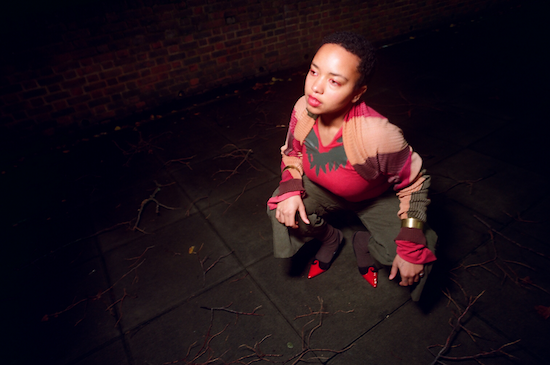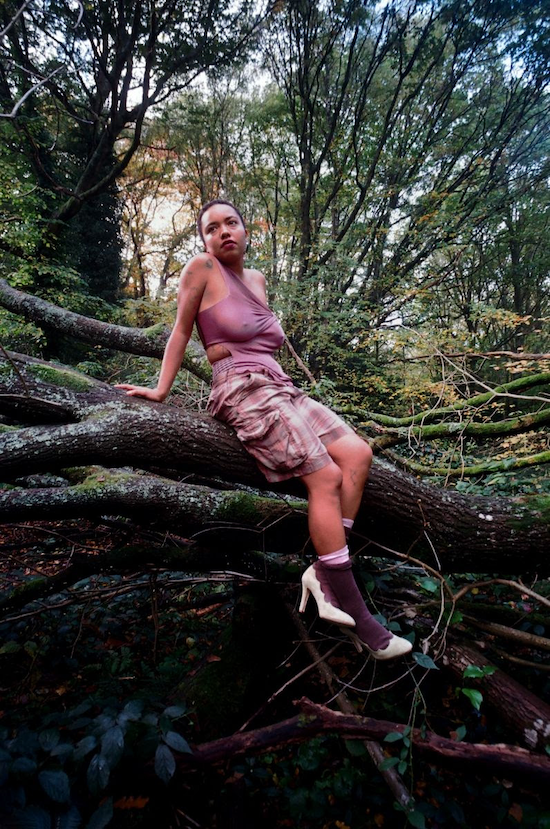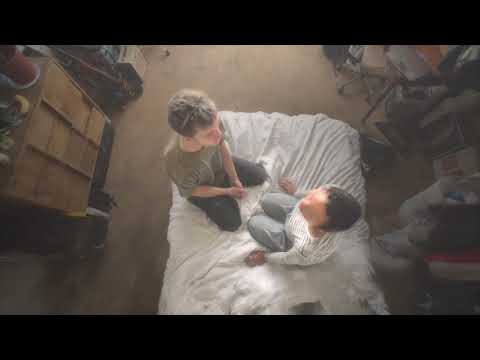Photos by Daniela Germade
‘it was then that i’, the first track released from feeo’s forthcoming EP run over, begins with gentle synth tones. She sets the scene as if wandering purposefully across dry leaves on the bed of a forest glade. Her voice is ambrosia. feeo radiates liquid gold which spills into the clearing, warming the tree bark as the bass swells and pulsates underfoot. feeo is transcendent and somehow grounding at the same time. Every fresh incorporation into the song draws attention, a rare wildflower to be admired first in isolation and then in relation to feeo’s ever-growing soundscape. She lays new sounds one by one, building a luscious, harmonious texture, the exquisite organ reverb and soft beats driving each crescendo to an ethereal climax.
“It’s very ‘bodily’, but it also occupies all realms,” feeo says as she talks about the motivation behind this unique track, which acts as a bridge between her new EP and its predecessor Ah, hunger!. It’s “a moment of complete equilibrium,” she says. “I’d never been in love before my current partner, I’d never had that experience of being with someone in that intimate space. In that moment of intimacy, he was radiating this warm golden light. I was like, ‘This must be what love is’.”
Ah, hunger! and run over are twin projects. They mirror each other, with the former exploring a sense of absence, need and yearning, and the latter describing a point beyond satisfaction, where things have drifted into consumerism and excess. In this track that acts as a link between the two, she is capturing that middle ground: a sublime sense of almost terrifying existential elation, juxtaposed against a deep feeling of being settled and physically present. ‘it was then that i’ is “about a moment of being in the middle,” says feeo. “You can’t be in equilibrium forever, which is why it’s this ephemeral thing. People evolve and love can change a lot, but I wanted to pay homage to that very momentary, yet incredibly spiritual thing I was experiencing.”
feeo is easy to speak to. She’s perceptive and consciously engaged, spinning rhythmic philosophical webs as she unveils her complex influences. The nonchalant way she explains sonic creation is a bit otherworldly. For feeo, “the full instrumentation comes all at once.” Songs often exist already formed in her mind. A multi-instrumentalist who began on the piano, feeo writes as well as produces, and “simply facilitates” the music she hears coming into being as best she can. She sounds mildly exasperated describing the process – transposing the exact combination of sounds she unearths from her mind’s ear is often impossible. But, from an outsider’s perspective, feeo feels like a musical mystic, a sonic prophet with revelatory synapses.
“I don’t write songs to a brief,” she says. “Even on a practical level, the fact that the new EP is quite close to the last project, for me, means I can totally see how much I’ve changed in a short space of time. Even though the EPs are a call and response, my approach sonically and songwriting-wise was more of a reflection of the music I was listening to and the worlds I was exploring at the time.” In run over, feeo’s musical and spiritual motivations are intangible: “I know everyone relates everything to lockdown and Covid and it’s not very sexy, but I definitely felt that in the past couple of years, there’s been a resurgence in me, I’ve been reborn into these dance music spaces. The energy is obviously really different, and I wanted to embody that it’s in some way collective.” There’s an experiential difference between gigs and raves, feeo says. “It’s both very individual and very collective being in a dance space, listening to dance music for six hours at a time rather than the short time of a live show. I was just really inspired by these experiences and having these divine moments, and I could hear that filtering into the way I approached production."

Electronic and dance music events are more collaborative, communal environments than traditional gigs. They tap into something which feels completely natural but also beyond the everyday human experience – what feeo calls the “collective consciousness”. By transporting people back to the dance floor through the inclusion of experimental production, and mixing in lyrics which talk of social change and political progression, feeo makes those welcome thoughts of collective responsibility and collective action that little bit easier to reach.
Dynamite underneath our feet
Treasure under wasteland
When they promised us change
We hid beneath the sheets
Sawdust in our hands
Petrol fumes overhead in the air
Ink black oil coursing down
Down in ribbons
Napalm hands reach for god like a flare
From the soil, from the ground, am I forgiven?
feeo – ‘tnteen’
“The thing that is integral to my practice is the value of personal narrative within political backdrops,” says feeo, resolute that art can and must have a purposeful role within cultural dialectics. “I think we haven’t reached the point yet of accepting nuance within the wider picture and the only way to increase nuance is to actually be receptive to all of the stories and listen and try to understand and share. It’s just a way I’m looking at it, threads that I’m tying together, adding to what otherwise is quite a homogeneous narrative – I think that’s the role of the artist.”
feeo’s main goal is the authentic manifestation of the music she feels. If she can’t play it alone and she needs another instrument to “serve the specific world which centres around a song” she’ll find it, describing instruments as “tools”. Ah, hunger!, is based more on her experiences of live music and drawing on the influence of people close to her who played guitar and double bass to carve out the right sound. Back in the 80s, feeo’s father was very “on the scene”, into punk and “really into British bands like The Smiths,” which all plays its part in that release. But feeo’s dad was also into “Black music – reggae and jazz” and her mum was a Joni Mitchell devotee. While there’s a strong return to the electronic domain with run over, such foundations remain ever-present
Her latest single, ‘tnteen’, features similar stripped-back, slowed down, broken dance beats to ‘it was then that i’. It tells the story of “explosives as a physical and political representation of excess, directly relating to the exploitation and depletion of land through mining precious stones.” Its dynamic energy is reminiscent of those collective dance sounds but carried on the back of an elaborate piano line with shimmering synths and hefty folk overtones. This means the pace of the track also provides ample room for its message to be properly digested. Especially in a delicate outro, there’s space to ruminate on the contrast between feeo’s lyrics about the volatility emanating from greed and the commodification of natural resources, and the track’s general euphony which offers a modicum of hope.
“I guess the hope is that people find themselves in their own individual worlds but then there’s actually quite a big overlap of understanding between these worlds, that individuality within a collective consciousness – that’s the dream. Everything’s open and up for interpretation, but I want people to feel moved and to feel the personal within the political and the micro within the macro.”
Across run over, this idea of looking inwards and then outwards, to note the personal within the context of the communal, public and political, is artfully balanced. There’s something thought-provoking and morally motivating about being in the presence of the ethereal and at the same time being firmly rooted here in the earth. Especially when feeo’s talk of revolution echoes through the mix.
“I often flip-flop between being very nihilistic about the state of things, then having this fundamental hope and belief in the personal localised connections that everyone experiences and also, you know, the beauty of life,” says feeo. “That’s what it comes back to for me, to find some kind of activism within…” she trails off. At a loss for words but gesticulating intently to the wider world, it’s clear what she means. feeo wants to inspire a kind of activism which is personal, unselfish and sustainable. In a society bursting at the seams with performativism, materialism and burnout, it’s no easy task. Thankfully, run over is here to add some much needed perspective.
feeo’s new EP run over is released on 21 March



